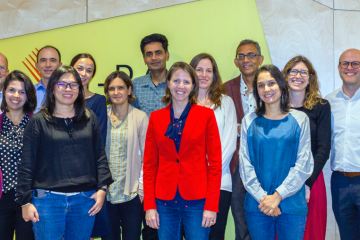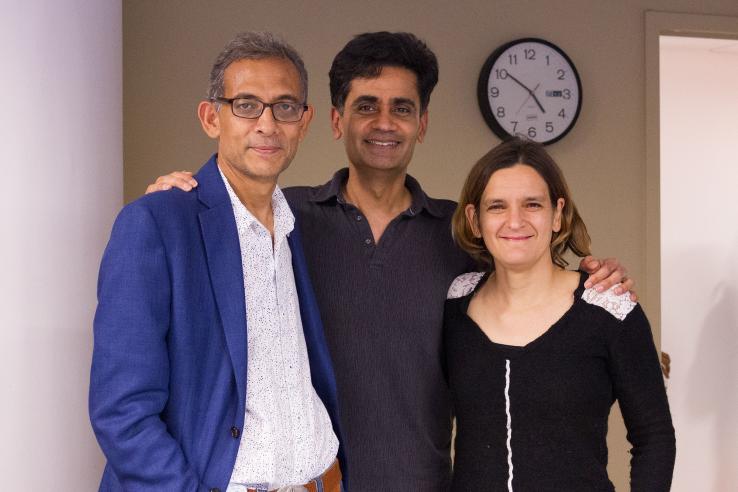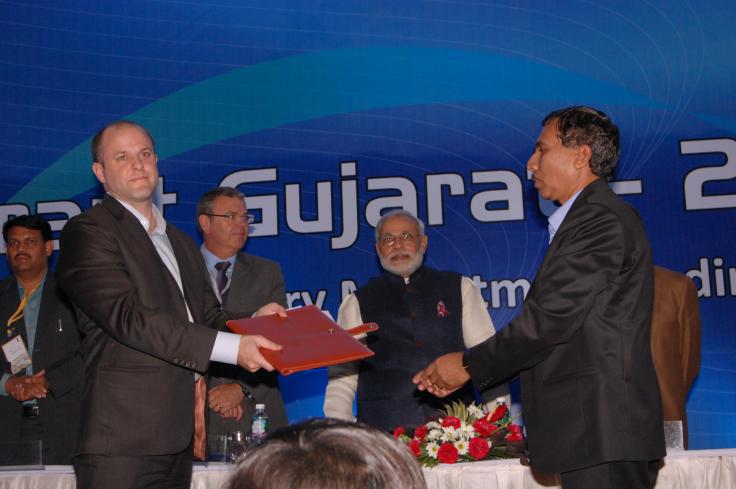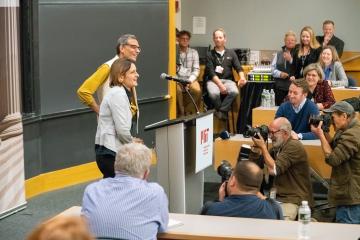
From research to action: How two Nobel laureates seeded more than just a methodology

An earlier version of this blog was posted in The Week.
More than a decade ago, I met Abhijit Banerjee and Esther Duflo to discuss joining a small center they had started at the Massachusetts Institute of Technology (MIT) called PAL, or the Poverty Action Lab (it was subsequently renamed J-PAL to recognize a generous endowment to MIT by its alum Mohammed Jameel). After my Master’s at the Delhi School of Economics, I had joined the IAS, attracted by the incredible satisfaction of working in development policy in the field. But I was often puzzled at how so many of our key decisions were not based on any semblance of rigorous evidence. After a few years working in the private sector, I was itching to come back to my roots. Talking to them in J-PAL’s three-room office with less than 10 staffers back then, I was drawn to the huge potential of their very simple vision: What if policymakers in governments, NGOs, and foundations could base their decisions on scientific evidence rather than instincts, ideology, or inertia?
Even though J-PAL was then only five years old, pioneers like Abhijit, Esther, Michael Kremer, and Rohini Pande (both also J-PAL affiliates) had already launched a number of field research studies in India and Kenya that would cement the role of randomized evaluations, or RCTs, as an incredibly important tool in the field of economics to understand what poverty alleviation programs work or not, and why. And J-PAL, along with our partner organization Innovations for Poverty Action (IPA), had begun to work with a number of other economists to run their research in many countries to expand the knowledge base of what works or not in global development. The dilemma they faced when I met them was even more challenging: How do we make sure that the results of this research do not just stay in academic journals but actually make their way to the policymakers who need it most in their decision making? How could such evidence inform programs that could be scaled up to reach millions?
I am thrilled that Esther and Abhijit, along with longtime J-PAL affiliate Michael Kremer, were just awarded the 2019 Nobel Memorial Prize in Economic Sciences for “their experimental approach to alleviating global poverty.” But while a lot of attention the past few days has been focused on their experimental methodologies, the policy action that has resulted from their research is equally significant—the Nobel award specifically mentions their work to fight poverty in practice, stating that “as a direct result of one of their studies, more than five million Indian children have benefitted from effective programmes of remedial tutoring in schools. Another example is the heavy subsidies for preventive healthcare that have been introduced in many countries.” The brilliance of Abhijit and Esther was in recognizing that this new research that they and a generation of amazing colleagues was producing would not by itself be sufficient to reach policymakers; more would need to be done to actually make a difference in the lives of millions.
Their response was to found and put their considerable political capital into not just raising funds for J-PAL but to recruit talented staff and provide the creative vision for it to be that agent of change. Over the past decade, J-PAL has moved way beyond just being a research center at MIT, but to take on work on the policy outreach and capacity building sides. We were able to do so thanks to the support of a coalition of additional funders such as the Gates, Hewlett, and MacArthur foundations and the Omidyar Network.

One of J-PAL's first partnerships with a state government in India was with Mr. Modi. This picture shows the signing of an MoU with the Government of Gujarat by John Floretta (Director of Policy, J-PAL).
As a result, J-PAL not only supports innovative research worldwide, but also forms strong partnerships with governments, NGOs, and donors to ensure that the knowledge generated by this research is understood and used to address the trickiest challenges of global poverty. This includes, for example, encouraging the use of preventive health products or tailoring instruction to students’ learning levels to increase learning. We also support governments and NGOs in scaling up programs found to be most effective.
Finally, J-PAL staff also help build the capacity of government officials and practitioners to understand and use evidence through customized in-person trainings around the world. To make this knowledge even more accessible, Abhijit and Esther lead a push to create a suite of online courses hosted by MIT’s edX platform that now reaches thousands of learners worldwide.
At the core of our work are our regional offices, which implement our affiliates’ field projects, conduct trainings, and work with policymakers to make sure they have all the information they need to move toward a culture of evidence-informed policy. Our first regional office was established at the Institute for Financial Management and Research (IFMR) in India to support J-PAL’s work in South Asia in 2007. Five more regional offices have since been established to support ongoing research, policy outreach, and training activities in Europe (at the Paris School of Economics in France), Latin America and the Carribean (at the Pontifícia Universidad Católica in Chile), Africa (at the University of Cape Town in South Africa), Southeast Asia (at the Institute for Economic and Social Research at the University of Indonesia), and North America (at MIT in the United States).
Investing in this infrastructure has paid off. J-PAL’s affiliated professors have designed and carried out almost 1,000 randomized impact evaluations to test and improve the effectiveness of social programs in more than 50 countries. J-PAL’s research covers traditional sectors such as agriculture, education, or health, as well as newer, cross-cutting sectors such as crime and violence, firms and the private sector, or gender. On the policy front, scale-ups of programs evaluated and found to be successful have to-date reached 400 million people worldwide, including the Teaching at the Right Level approach with the Indian NGO Pratham and an identity card program for a massive food subsidy program in Indonesia.
As global poverty continues to affect hundreds of millions worldwide, our work is more urgent now than ever. J-PAL is responding to this critical need by launching cutting-edge initiatives like the Innovations in Data and Experiments for Action Initiative (IDEA). IDEA supports governments, firms, and non-profits who want to make their administrative data accessible; analyze it; and partner with researchers to design innovative programs, evaluate program impact through randomized experiments, and scale up successful programs.
Abhijit, Esther, and Michael receiving this year’s Nobel Prize in Economics is a recognition of the creativity and value of the methodology of randomized evaluations. But it is equally a recognition of how the outputs from this methodology can improve the lives of millions of people worldwide. This required not just the genius of the researchers but the hard work of thousands of field research, policy, and training staff, the commitment of hundreds of governments and NGOs to evaluate and question the impact of their own programs, hundreds of thousands of program participants who also agreed to be surveyed, and the support of visionary funders.
In this journey, I feel particularly fortunate to have discovered two incredible human beings as my dear friends. Abhijit is one of the smartest people I have ever met, and not just at the weekly MIT-Harvard development seminars where he has this uncanny ability to see three steps ahead of most people in the room as to where the presenter’s model is headed, all while multi-tasking with his email and sometimes even phone calls! But more importantly for me, this also extends to discussions with him on policy or field implementation issues—his ability to see the big picture, predict how people will respond, and suggest solutions has been invaluable not just for J-PAL but also for our partner organizations. For the past five years, Abhijit and I have been co-Chairs of J-PAL’s Innovations in Government Initiative (IGI) that supports creative partnerships between governments, researchers, and donors to find innovative solutions to key policy challenges worldwide. Every single one of those projects, whether in Mexico, India, or Kenya has benefited from his insights.
And Esther is one of the most relentless, hard working, and visionary persons I have met. She never accepts something as “not possible” and challenges herself and everyone around her to think out of the box and aim higher. Thanks to her, we have applied for moonshot multi-million dollar grants that helped us fund a generation of research projects in areas as diverse as measurement of corruption, strengthening democracy, or improving delivery of urban services. But Esther’s abilities don’t just stop at big-picture thinking. She has outstanding management instincts. For the past eight years, Esther and I have been co-Scientific Directors of J-PAL’s largest regional office for South Asia, which runs dozens of projects in India in partnership with state governments like Gujarat (launched when Prime Minister Modi was the Chief Minister), Haryana, Punjab, and Tamil Nadu. The office also runs capacity building work with various government departments. As you can imagine, this creates numerous day-to-day management and operational challenges. Despite being so busy with her own research and editing responsibilities, Esther manages to find time to help brainstorm and provide solutions that are as creative as her research!
I remember coming home from that first meeting with Abhijit and Esther over a decade ago and saying to my wife and fellow economist Gita Gopinath that “this is a Nobel-winning idea, but it is going to require a lot of work and a long time.” Her response was, “With people like Abhijit and Esther, you never know, it might be sooner than you think.” She could not have been more right!


